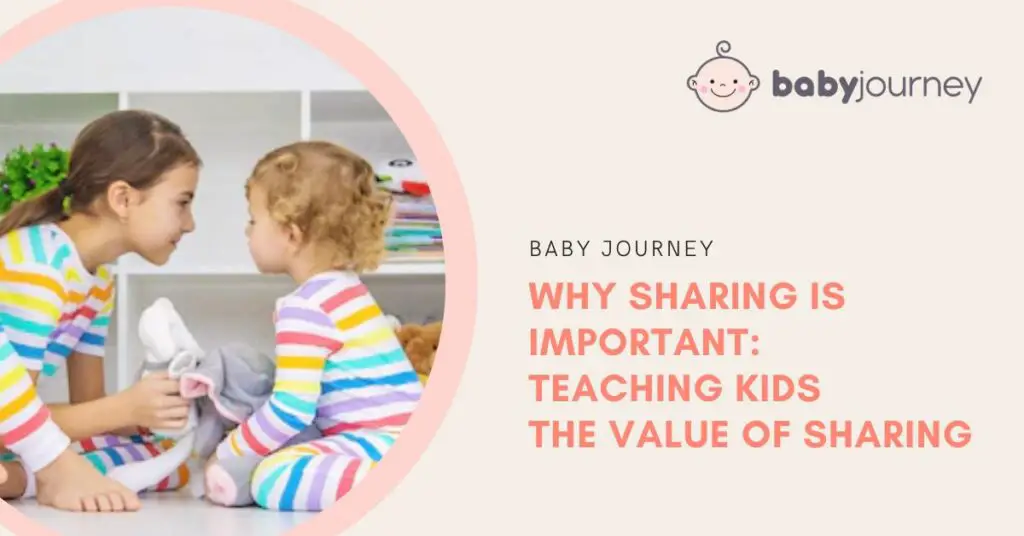Sharing is an essential social skill that children need to learn as they grow up. It not only helps children build relationships but also teaches them important values like empathy, kindness, and generosity. Children who learn to share at a young age are more likely to become well-adjusted adults who can work cooperatively with others.
Teaching children to share can be challenging, but it is an important part of their development. Parents and caregivers can help children learn to share by providing opportunities to practice, praising them when they share, and modeling sharing behavior themselves. It’s important to remember that sharing is a skill that takes time to develop, and children may need guidance and support along the way.
Parents and caregivers can also help children understand the difference between sharing and taking turns. Sharing involves giving something to someone else with no expectation of getting it back, while taking turns involves sharing something for a set amount of time before giving it to someone else. By teaching children, the difference between sharing and taking turns, they can develop a better understanding of how to share and cooperate with others.
Why is Sharing Important
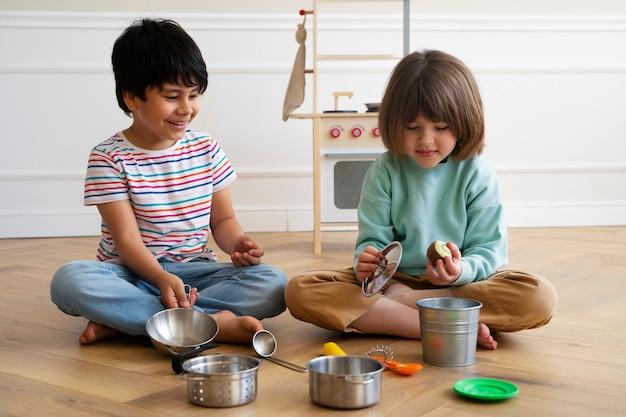
Sharing is a critical life skill that children should learn from an early age. It helps them develop essential social and emotional skills that are necessary for their growth and development. Sharing is a way of showing empathy, respect, and fairness towards others, which are essential values that children should learn.
When children learn to share, they develop a better understanding of their feelings and emotions. They learn to manage their emotions, which helps them build better relationships with others. Sharing also helps children develop a sense of responsibility and accountability towards others, which is an essential life skill.
Sharing is also important because it helps children learn about the world around them. When they share, they gain access to new knowledge and information, which helps them learn and grow. It also helps them develop better problem-solving skills and creativity.
Teaching children to share is an essential part of their development. It helps them learn important life skills that they will use throughout their lives. Children who learn to share are more likely to be successful in their personal and professional lives.
In summary, sharing is an essential, everyday life, skill that children should learn from an early age. It helps them develop important social and emotional skills, gain access to new knowledge and information, and become responsible and accountable towards others. Teaching children to share is an essential part of their development and helps them become successful in their personal and professional lives.
Also Read: 12 Great Tips & Tricks On How To Discipline A Toddler From The Start
The Concept of Sharing
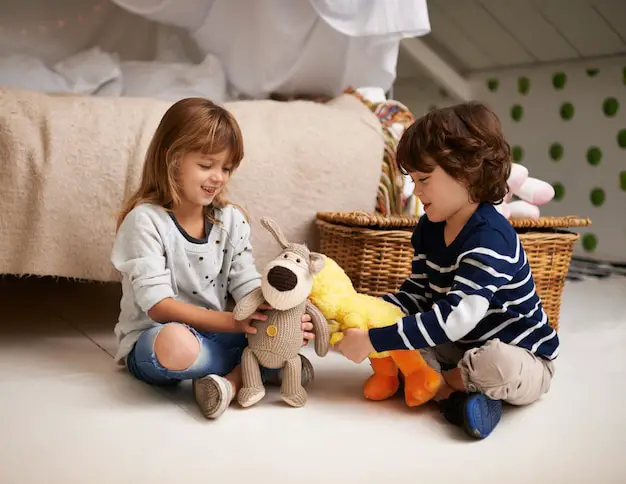
Sharing is a complex concept that involves more than just giving up something one has. It is a skill that many children need to learn, and parents can help them develop this skill by teaching them how to share. Sharing is an essential life skill that helps children make and keep friends, cooperate with people, and develop empathy.
Understanding at Different Ages
Children’s understanding of sharing changes as they grow older. A two-year-old’s grasp of the idea of having to share a toy is quite different from how a four or five-year-old child learns and sees sharing. At the age of two, children are in the early stages of learning to share, and they may not understand the concept fully. They may not want to share their toys because they believe that the toys belong to them.
As children reach three and four years old, they start to understand the concept of sharing, but it can still be challenging for them to put it into practice. They may have a hard time sharing their toys, especially if they are new or if they have a particular attachment to them.
By the age of five, most children have a good understanding of sharing. They can share their toys with others and can take turns playing with them. They understand that sharing is a way to build relationships and make friends.
Sharing and Emotions
Sharing can be an emotional experience for children. They may feel happy when they share their toys with others, but they may also feel sad or angry when they have to give up something they like. Parents can help children manage their emotions by acknowledging their feelings and teaching them how to express them appropriately.
Children may also have a hard time sharing when they feel that their needs are not being met. For example, if a a child’s attention is hungry or tired, they may not want to share their toys. Parents can help children understand that sharing is a way to build relationships and that it is essential to be kind to others.
In conclusion, sharing is an essential life skill that children need to learn. Parents can help children develop this skill by teaching them how to share and by providing opportunities to practice. Children’s understanding of sharing changes as they grow older, and parents need to be patient and supportive as their older children also learn this skill.
How to Teach Child to Share
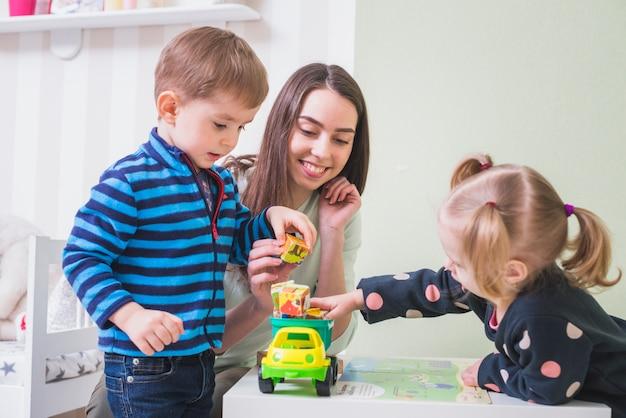
Teaching child to share is an important part of their social and emotional development. Here are some effective ways parents can help their children learn to share:
Role of Parents
Parents play a crucial role in teaching children how to share. They can act as role models by sharing their own possessions and taking turns with their children. Parents can also create a positive and encouraging environment that promotes sharing.
Creating Opportunities
Creating opportunities for child to share is essential. Parents can provide toys or activities that require sharing with other child, such as board games or group art projects. They can also encourage children to share by inviting friends over for playdates. Parents can also ask fun this or that questions for kids related to sharing.
Encouraging Turn-Taking
Encouraging turn-taking is another way to teach child how to share. Parents can teach children to take turns by modeling this behavior and using language that reinforces the concept of turn-taking. For example, “It’s your child your turn to play with the toy, and then it will be your friend’s turn.”
Using Language and Communication
Using language and communication is a powerful tool in teaching child how to share. Parents can use positive language to encourage sharing, such as “Great job sharing your toy!” They can also use language to help children understand the emotions of others, such as “Your friend looks sad because they don’t have a toy to play with.”
Dealing with Conflicts
Dealing with conflicts is an important part of teaching child how to share. Parents can help children learn to resolve conflicts by guiding them through the process of sharing and taking turns. By helping children understand each other and other people’s feelings and perspectives, parents can teach child to be empathetic and respectful towards others.
Overall, teaching child to share is an important part of their social and emotional development. By providing opportunities for sharing, encouraging turn-taking trouble sharing, using language and communication, and dealing with conflicts, parents can help their children learn this valuable skill.
Sharing in Different Contexts
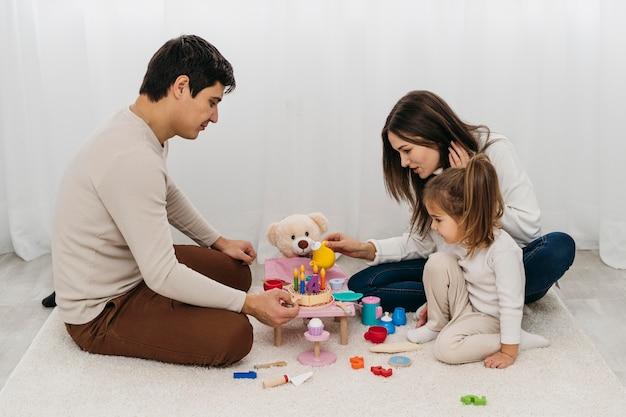
When it comes to child learn about sharing, it’s important to understand that sharing can take many different forms depending on the context. Here are some different contexts in which sharing can occur, along with some tips for how to teach child to share in each context.
Sharing Toys
Sharing toys is a common situation where child need to learn about sharing. Parents can encourage sharing by providing opportunities for child to share toys with siblings, friends, or playmates. Here are some tips:
- Teach child to take turns with toys instead of hogging them all to themselves.
- Encourage child to share toys that they aren’t currently using.
- Praise kids when they share toys with others.
Sharing Food
Sharing food is another context where kids can learn about sharing. Parents can encourage sharing by teaching kids about the importance of sharing food with others. Here are some tips:
- Teach kids to offer food to others before taking it for themselves.
- Encourage kids to share snacks with siblings, friends, or playmates.
- Praise kids when they share food with others.
Sharing Space
Sharing space is another important context where kids need to learn about sharing. Whether it’s sharing a bedroom with a sibling or sharing a play area with friends, kids need to learn how to share space with others. Here are some tips:
- Teach kids to be considerate of others when using shared space.
- Encourage kids to take turns using shared space.
- Praise kids when they share space with others.
In summary, child learn about sharing is an important part of their social development. By providing opportunities for kids to share toys, food, and space, parents can help kids learn how to share in different contexts. With patience and persistence, parents can help their kids develop the skills they need to become kind and considerate individuals.
Teaching Through Play
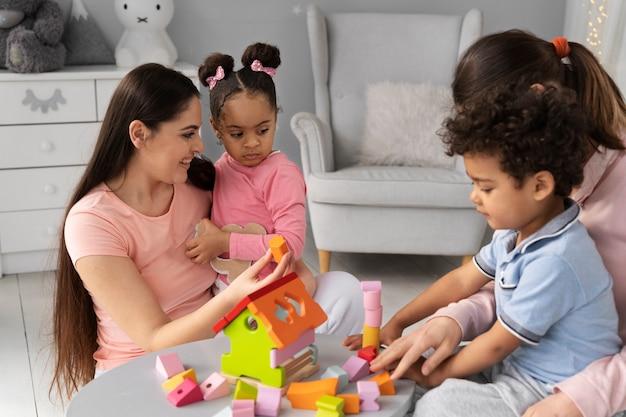
Teaching kids to share can be a challenging task, but incorporating play into the learning process can make it easier and more enjoyable for both parents and children. Play is a natural way for children to learn and develop social skills, and it can be used to teach kids how to share and play cooperatively with others. In this section, we will explore the importance of playdates, games, and parallel play in teaching kids to share.
Importance of Playdates
Playdates are a great way for young children to socialize and learn how to share with others. During playdates, children have the opportunity to interact with their peers and practice sharing toys and taking turns. Parents can facilitate sharing by providing a variety of toys and setting clear expectations for sharing and taking turns. By encouraging children to share and cooperate with others, parents can help them develop important social skills that will benefit them throughout their lives.
Games and Sharing
Playing games is another effective way to teach kids how to share. Games that require turn-taking and sharing, such as board games and card games, can help children learn how to wait their turn, share toys, and play cooperatively with others. Parents can use games as a fun way to teach kids about sharing and taking turns, and can use positive reinforcement to encourage good behavior.
Parallel Play
Parallel play is a type of play in which children play alongside each other without necessarily interacting with each other. While it may seem like children are not learning how to share during parallel play, it is actually an important part of their development. By playing alongside each other, children learn how to be in the presence of others and how to share space and toys. Parents can encourage parallel play by providing a variety of toys and creating a safe and comfortable play environment.
In conclusion, incorporating play into teaching kids how to share can be an effective and enjoyable way to help them develop important social skills. Playdates, games, and parallel play are all great ways to teach kids about sharing and cooperation. By providing a variety of toys, setting clear expectations, and using positive reinforcement, parents can help their children learn the importance of sharing and play cooperatively with others.
Dealing with Challenges in Sharing
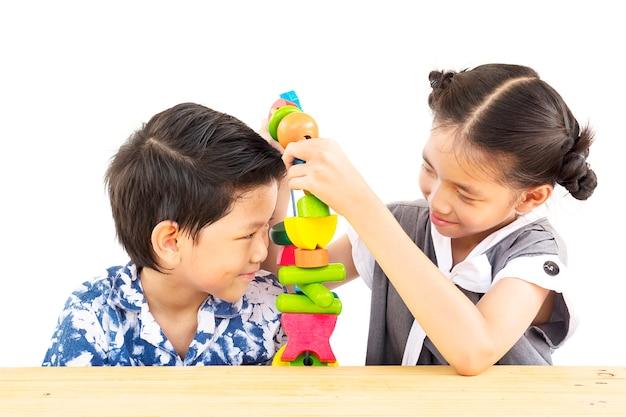
Sharing can be a challenging concept for young children to understand and practice. Children may experience disappointment, possessiveness, and aggression when sharing. However, parents and caregivers can help children learn to share by addressing these challenges in a positive and constructive manner.
Handling Disappointment
When a child is disappointed that they must share a toy or object, it is important to acknowledge their feelings while also encouraging them to share. Parents and caregivers can help children understand that sharing is a positive behavior that can lead to positive outcomes, such as making new friends or having fun together. Praising children for sharing can also help reinforce this positive behavior.
Addressing Possessiveness
Children may exhibit possessive behavior when they feel that their toys or objects are being taken away from them. In such cases, it is important to teach children that sharing does not mean giving away their possessions permanently. Parents and caregivers can encourage children to take turns playing with toys or objects, which can help them learn to share without feeling like they are losing their possessions.
Managing Aggression
Aggressive behavior, such as hitting or pushing, can sometimes occur when children are asked to share. Parents and caregivers can help children manage their aggression by teaching them alternative ways to express their feelings. For example, children can be taught to use words to express their feelings or to take deep breaths when they feel angry or upset.
In addition, parents and caregivers can model good behavior by sharing with their children and praising them when they share with others. This can help children understand that sharing is a positive behavior that is valued by others.
Overall, teaching children to share can be a challenging but rewarding process. By addressing challenges such as disappointment, possessiveness, and aggression in a positive and constructive manner, parents and caregivers can help children develop good sharing habits that will benefit them throughout their lives.
Research and Expert Opinions on Sharing
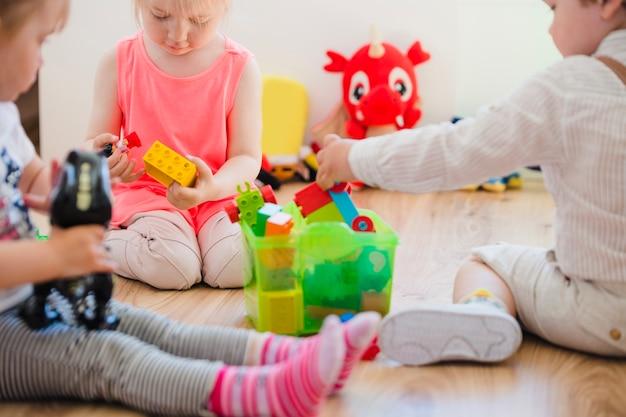
Sharing is a crucial social skill that children must learn to develop healthy relationships with their peers. Experts agree that sharing is vital as it helps children learn to cooperate, negotiate, take turns, and cope with disappointment. Research shows that children who learn to share early in life have better social skills and are more successful in school and later in life.
According to a survey conducted by Zero to Three, 88% of parents believe that sharing is an essential skill for their children to learn. However, only 32% of parents feel confident in teaching their children how to share. This highlights the need for parents and caregivers to understand how to teach children to share effectively.
The University of Toronto conducted research that showed that children as young as two year old and 18 months can understand the concept of sharing. The study found that toddlers were more likely to share when they saw others sharing and when they received praise for sharing. This highlights the importance of modeling and positive reinforcement in teaching children to share.
Experts recommend that parents and caregivers create opportunities for children to practice sharing. This can include sharing toys, snacks, and other items with siblings and friends. It is also essential to praise children when they share and to teach them to take turns and negotiate with others.
Teaching children to share is not always easy, and it requires patience and consistency. However, the benefits of sharing are significant for children’s development, and it is an essential skill that children must learn to develop healthy relationships with others.
Conclusion

Sharing is an essential social skill that children need to learn to be successful in their personal and professional lives. It helps them build positive relationships with other children, develop empathy, and improve their communication skills.
Child learns to share can be challenging, but it is a crucial part of their development. Parents and caregivers can use various strategies to encourage children to share, such as modeling sharing behavior, praising them when they share, and creating opportunities for them to practice sharing.
It is also important to note that sharing does not mean giving up everything a child owns. Parents should teach children to differentiate between what they can share and what they cannot. For example, children may not want to share their favorite toy or blanket help your child, and that is okay.
In addition, parents should avoid forcing children to share, as this can cause resentment and negative feelings towards sharing or else being selective sharing. Instead, they can encourage children to take turns or engage second child in cooperative play, which can help them learn to share in a fun and positive way.
Overall, teaching young children to share is a process that requires patience, consistency, and positive reinforcement. By creating a supportive and encouraging environment, parents and caregivers can help children develop this critical social skill, which will benefit them throughout their lives.


